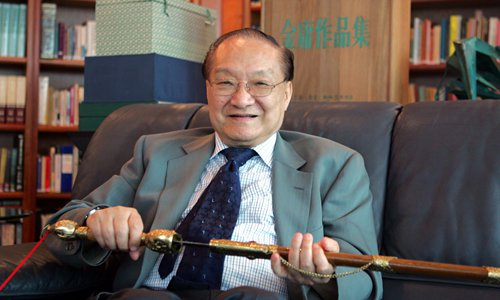
Cha Leung-yung or Louis Cha, a renowned Chinese Wuxia novelist known by his pen name Jin Yong, died at 94 at a hospital in Hong Kong on Tuesday. This photo of him was taken on August 12, 2004 in his Hong Kong home. Photo: VCG
Cha Leung-yung or Louis Cha, a renowned Chinese Wuxia novelist, known by his pen name Jin Yong, died at a hospital in Hong Kong on Tuesday. He was 94.
Wuxia is a traditional Chinese novel theme, featuring martial arts and Chinese chivalry. Cha's Wuxia novels are regarded as one of the "three Legs of the Tripod of Wuxia" by Chinese communities around the world.
Cha died at the Hong Kong Sanatorium and Hospital, and dozens of reporters waited for the hospital to release a statement on Cha's death.
As of press time, the hospital failed to release a statement, and an employee of the hospital told the Global Times on Tuesday that there is no precedent for the hospital to release a statement for the deceased.
Patients at the hospital told the Global Times that they didn't even know Cha was in the hospital, and were shocked when they were told Cha died there.
Charming the world
With 15 classic Wuxia works created between 1955 and 1972, Cha has been regarded as one of the three greatest Wuxia writers along with Gu Long and Liang Yusheng, both of whom had passed away. His works were bestsellers among Chinese speakers, having sold more than 100 million copies around the world, not including pirated versions. They were also adapted in films, TV shows, comics and radio dramas, and even video games.
Cha's works have influenced generations of Chinese people, and former Chinese leader Deng Xiaoping was also a fan. Chinese people from the 1960s to the present have read, enjoyed and remembered his novels.
People.cn reported that those in the Chinese mainland were not allowed to read Wuxia stories during the Cultural Revolution (1966-76), but Deng enjoyed Wuxia. Deng got a Wuxia novel from a friend who returned from Hong Kong in 1973, and he liked it so much that he kept it with him.
Cha's works were banned in the Chinese mainland before 1981, but after his meeting with Deng on July 18 1981, the ban was lifted and his novels gained great popularity in the Chinese mainland.
After Deng became the top leader of China and launched the reform and opening-up in 1978, Cha, who was an editorial writer at Hong Kong newspaper Ming Pao, praised Deng's policy. Cha was also the newspaper's co-founder.
Yu Dan, a professor at Beijing Normal University, said on her Weibo account on Tuesday that "we are the generation who read Cha's works quietly in the classroom in high school. Wuxia is in our blood."
Cha's works were not just a hit among Chinese readers. Earlier this year, one of his most popular works, Legends of the Condor Heroes, was published in English for the first time. Translated by Anna Holmwood, the English version brought the spirit of Chinese Wuxia to the world.
"I am very saddened to hear the news of Mr. Louis Cha's death," Aamir Khan, a famous Indian filmmaker and actor, tweeted. "His book The Deer and The Cauldron gave me a lot of joy. I read it just a few months back. I wish I could have met him. He has given so much joy to so many generations. I am his big fan."
Cha's death also struck foreign readers.
"I am so sorry for the loss of this famous novelist and essayist of our time," Alawi Shaaban Swabury, a Tanzanian businessman, told the Global Times on Tuesday.
Swabury said he started reading Cha's novels when he was a child. He said the first Cha book he read, The Book and the Sword, was so inspiring and interesting.
He said Cha's books familiarized many foreigners with Chinese culture and kung fu.
Chinese netizens also expressed their sadness. News of his death flooded the WeChat Moments on Tuesday.
"He is the soul of the Chinese Wuxia spirit," netizen Dudubupale said on Chinese social platform Sina Weibo, "Hope he can rest in peace."

